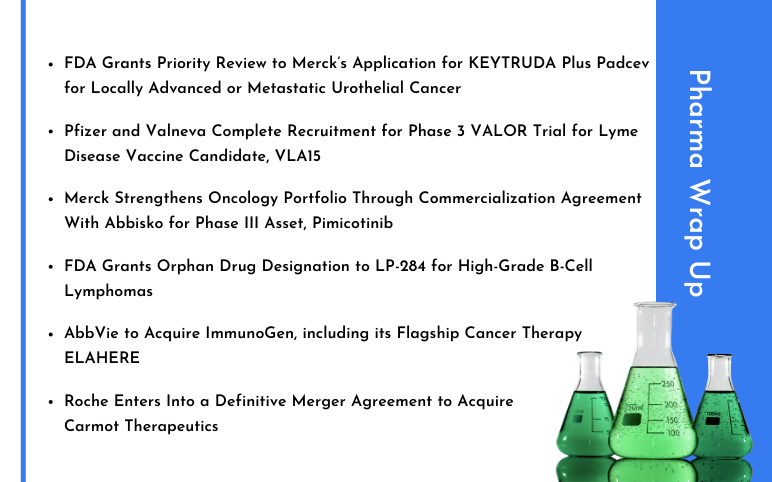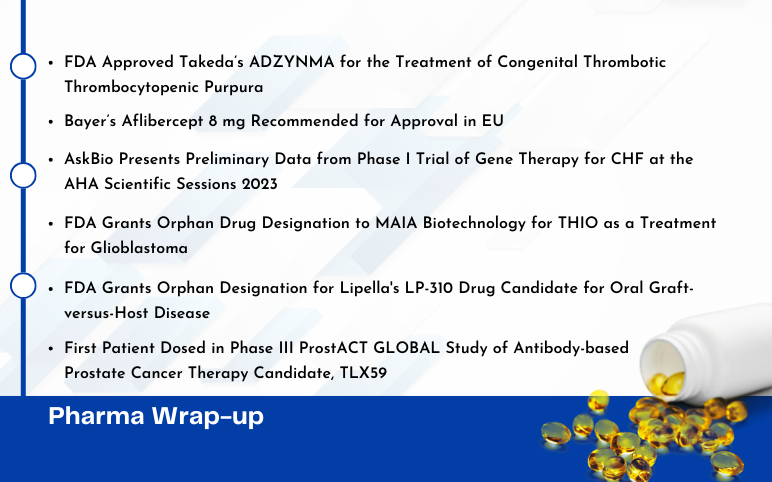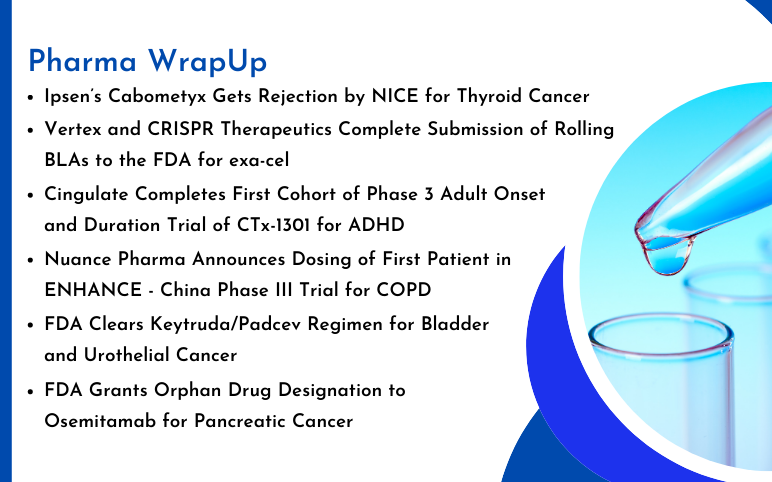Merck, Eisai in renal cancer market; G1 Therapeutics on Cosela’s approval; Takeda’s Maribavir; Astellas/Seagen Padcev
Feb 16, 2021
Table of Contents
Merck’s Keytruda-Eisai’s Lenvima Combo Make the Cut in Renal Cancer
Numerous immunotherapy-based combinations are already trying in the old game of gleek to stake up some share in previously untreated, metastatic kidney cancer; however, the market seems to expand as the new entrants continue to make their entry.
Merck and the partner Eisai presented investigational data from the pivotal Phase III CLEAR study (KEYNOTE-581/Study 307) evaluating Keytruda and Lenvima combination. The results demonstrated statistically significant and clinically meaningful improvements in progression-free survival (PFS) in first-line advanced renal cell carcinoma (RCC) patients. The combo treatment also met key secondary endpoints of overall survival (OS) and objective response rate (ORR). The data was presented at the virtual 2021 Genitourinary Cancers Symposium (ASCO GU) and also published in the New England Journal of Medicine.
Downloads
Click Here To Get the Article in PDF
Recent Articles
- Roche’s drug; Cancer drugs risk; FDA norms; Takeda sets deal
- FDA Approves Turalio; Sosei Heptares and Takeda Forge R&D Partnership
- Novartis joins; Sanofi weighs Actelion; Valeant and Takeda’s $10B deal; Astellas scouts pip...
- Celiac Disease: The Hidden Epidemic of Gluten Sensitivity
- AZ offloads; Pfizer’s deal; Takeda’s work on plant; Germany’s doc payment
Successful in outwinning Pfizer’s Sutent, Keytruda-Lenvima duo would be up against already approved therapies such as Bristol Myers Squibb’s Opdivo-Yervoy duo and even Merck’s combination of Keytruda and Pfizer’s Inlyta (axitinib), once approved.
G1 Therapeutics shares shoot up after FDA Okéd Cosela
The US FDA has given green-light to G1 Therapeutics’ first-in-class agent Trilaciclib (Cosela) for the treatment of patients with extensive-stage small-cell lung cancer (SCLC) to reduce chemotherapy-induced bone marrow suppression.
The approval of Cosela marks an important advancement in healthcare in patients with extensive-stage small-cell lung cancer receiving chemotherapy. Chemotherapy drugs while killing cancer cells also damages normal tissues. The bone marrow is particularly vulnerable in this case. With damages to the bone marrow, the production and normal functioning of red blood cells, white blood cells, and platelets get hampered.
So far, the available approaches have been implementing the use of growth factor agents to accelerate blood cell recovery after the bone marrow injury has occurred, coupled with antibiotics and transfusions. However, Cosela uses a different approach by preventing the damage. The drug is the first and only therapy that is developed and approved to protect bone marrow (myeloprotection), which is injected prior to treatment with chemotherapy, asserts the US oncology drug developer, G1.
Astellas/Seagen gears up for US filing of bladder cancer drug Padcev
Astellas and Seagen are now prepared to go ahead with the final approval from the regulatory agency for Padcev (enfortumab vedotin) in patients with previously treated advanced urothelial cancer.
Padcev is a first-in-class antibody-drug conjugate (ADC) directed against Nectin-4, a protein
located on the surface of cells and highly expressed in bladder cancer. The therapy is the first therapy of its kind to target the Nectin-4 protein.
Padcev was given accelerated approval by the FDA in December 2019 in advanced urothelial cancer on the basis of phase 2 response data. However, now the duo has reported positive primary results from the phase 3 EV-301 trial comparing Padcev to chemotherapy and are positive about receiving FDA affirmation.
The companies will now plan to move forward with the evaluation of drugs in other cancers with high expression of NECTIN-4, including triple-negative breast cancer, non-small cell lung cancer, head and neck, and certain types of gastro-oesophageal cancer.
Takeda wins big in cytomegalovirus infection market
Takeda has announced new, late-breaking Phase 3 data from the TAK-620-303 (SOLSTICE) trial, for the investigational drug TAK-620 (maribavir) in transplant recipients with refractory, with or without resistance (R/R), cytomegalovirus (CMV) infection/disease.
Maribavir is an orally bioavailable anti-CMV compound. It is the only antiviral agent in Phase 3 development for the treatment of post-transplant patients with CMV in SOT or HCT that targets and inhibits the UL97 protein kinase and its natural substrates.
The therapy met its primary endpoint of superiority compared to conventional antiviral therapies, one or a combination of ganciclovir, valganciclovir, foscarnet, or cidofovir), suggesting maribavir is better at eliminating the virus from the blood than existing treatments such as ganciclovir and valganciclovir. Although cytomegalovirus infections are quite common and do not cause many symptoms, however, can be threatening in people with compromised immune systems.
The drug started its journey with GSK who evaluated its pre-clinical setting and out-licensed it to ViroPharma. ViroPharma led the drug through phase II; however, eventually passed it down to Shire (acquired by Takeda now). It is about time now that the drug reaches its goal.
Downloads
Article in PDF
Recent Articles
- Notizia
- Novartis joins; Sanofi weighs Actelion; Valeant and Takeda’s $10B deal; Astellas scouts pip...
- Takeda acquisition on Shire raises its share by 25 percent
- Actinium Announces Phase III SIERRA Trial Results; FDA Approves Apellis’s Geographic Atrophy Drug...
- Evotec, Chinook Teams Up for CKD Therapy; HitGen & UPPTHERA in Drug Delivery Research; Artiv...




